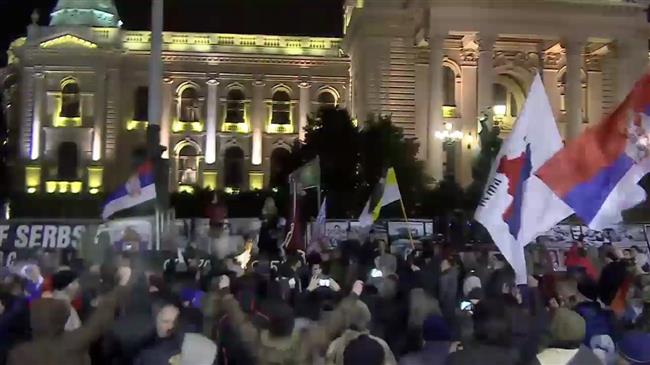Kosovo president, forces temporarily enter Serbian region
Kosovo’s special forces have made their way into a Serbian enclave while escorting Kosovar President Hashim Thaci, prompting Serbia to put its armed forces on high combat alert.
Troops from the Regional Operational Support Unit (ROSU), which provides personal protection to VIPs, were deployed around the Gazivoda Lake and hydro-power plant on Saturday to provide security for Thaci, who had entered the area apparently without coordination with Serbian authorities.
The forces also reportedly entered the Center for Ecology and Sport Development in Zubin Potok Town near the power plant. Shortly afterwards, they left the area.
Several Serbian citizens were reportedly detained during the brief incursion.
Serbia’s President Aleksandar Vucic ordered the military on the highest combat alert level, and Interior Minister Nebojsa Stefanovic also ordered police to place all special police units in the state on the highest alert.

“Serbia informed all the international institutions about the incident at Gazivoda, but we haven’t received any response neither from the EU nor the NATO… Serbia also warned the official Pristina as well as the international community that it won’t tolerate any form of violence against Serbs,” Marco Duric, the director of the Office for Kosovo and Metohija in the Serbian government, said.
He said the ROSU special forces, masked and armed with rifles, had been deployed to the Gazivoda Lake so that President Thaci and his associates could go there, take a walk, and take a couple of photos.
“In order to do this, they had to remove all the people standing in their way, they had to apprehend all the Serbs who were there at the time,” Djuric said at a press conference. “They barged into the Ecology and Sports Centre, where they apprehended people for no reason, with the aim of intimidating the Serbs living in Kosovo.”
Kosovo’s Thaci described the incident as a friendly excursion to Gazivoda, where he spent some 15 minutes.
Protests in Pristina
Meanwhile, protesters staged a rally in central Pristina on Saturday to oppose a possible territory swap with Serbia proposed by Thaci.
Opposition Vetevendosje Party leader Albin Kurti was among the protesters, who marched through the city.
“We are not against anyone but we are against the worst. Every thought that is bad for the country, we are against it,” one protester said.
The proposed swap foresees the Presevo Valley in southern Serbia — populated mostly by ethnic Albanians — joining Kosovo. In exchange, politicians from both sides have reportedly suggested that Serbia might regain control over an area in north Kosovo, which is populated mostly by ethnic Serbs.
Muslim-majority Kosovo, which gained independence in 2008, was a region in former Yugoslavia.
Kosovo is currently recognized by 117 countries as an independent state, including the United States and most members of the European Union, or the EU. Five of the 28 EU member countries — namely Spain, Slovakia, Cyprus, Romania, and Greece — haven’t recognized Kosovo’s independence from Serbia.
Serbia still sees Kosovo as part of its territory and has the support of Russia and China.
Occupation of Syria’s highest peak Mount Hermon part of ‘Greater Israel’ project
Iran: Syrian people will decide their future without foreign interference
IRGC says Iran’s power exceeds borders, warns enemies to adjust themselves
Dozens detained, several wounded in Israeli raids in West Bank
‘Ethnic cleansing’: Hamas blasts Israeli attacks on Gaza hospital amid intl. silence
Saudi delegation meets HTS leader at presidential palace in Damascus
Relentless Israeli ceasefire violations justify need for self-defense: Lebanese MP
Tel Aviv tells Damascus Israeli forces will remain in occupied territory: Report











 This makes it easy to access the Press TV website
This makes it easy to access the Press TV website